FLR 199: Latinx Folklore (Calaveras, Corridos, & Quinceñeras)
First session, June 22 – July 19, 2020
ONLINE (CANCELLED)

Folklore is the study of expressive vernacular culture, ranging from everyday actions like greetings and painting your nails to special ways we deal with coming-of-age or dying; it includes the lullabies that put children to sleep and the stories we tell to and about our families. Historically folklore scholars have celebrated and advocated for the creations and performances of groups of people whose accomplishments cosmopolitan society has deemed ignorant and/or not of much cultural value.
Latinx expressive culture speaks to the experience of being part of U.S. culture. “Latinx” is the most recent term being used to refer to a group of people who both identify or are identified with the cultural consequences of Ibero-American colonial history and U.S. expansionism; economic, racial, and transnational politics also play a fundamental role in shaping this identity. The recent use of the “x” ending indicates an awareness of gender fluidity within this identity. This course introduces students to important genres of Latinx expressive culture, including celebrations like Dia de Muertos, popular musics like corridos and salsa, and traditions like the quinceañera and the parranda. We will particularly focus on expressions of Mexican and Puerto Rican heritage, but we also examine folklore associated with peoples of other Caribbean, Central and South American heritages as well. Students will develop an understanding of how Latinx people have contributed to and participated in the formation and development of the greater U.S. culture.
Spring 2020 Course Offerings
MUS 359: Music of the Americas
TR 12:00-1:20 PM + Discussion Section, Room: Clinical Services 250 (CLS 250)
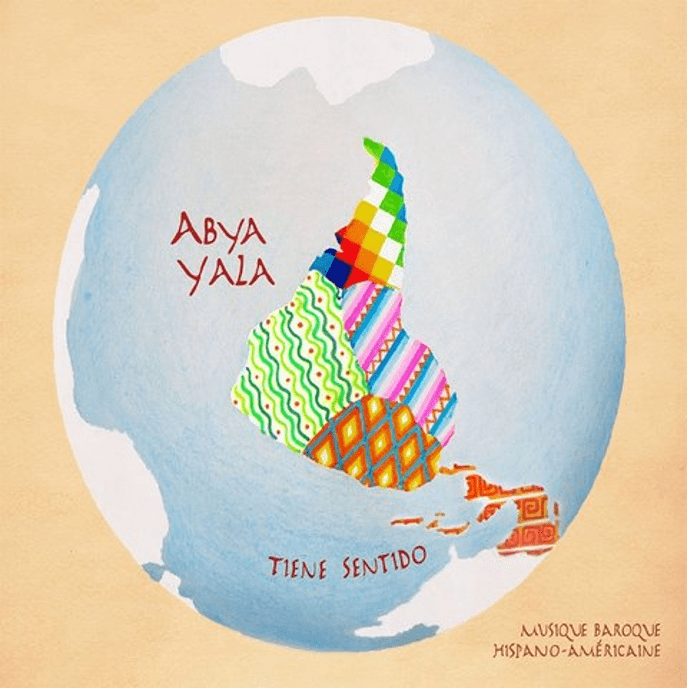 The Americas is a broad geographic expanse covering a range of cultures that is impossible to cover in-depth in a single academic term. There are ideas, however, that can help us bring important aspects of these cultures together: colonialism, processes of cultural exchange, and modernity. We will study these ideas through the music and cultures of at least three countries in the Americas (Brazil, Mexico, and Peru). No musical experience is necessary, but students will be asked to think through listening examples to understand why different musics sound the way they do. While we focus on three regions, the ideas are applicable throughout the Americas. This course fulfills the AC (American Cultures) Multicultural Requirement.
The Americas is a broad geographic expanse covering a range of cultures that is impossible to cover in-depth in a single academic term. There are ideas, however, that can help us bring important aspects of these cultures together: colonialism, processes of cultural exchange, and modernity. We will study these ideas through the music and cultures of at least three countries in the Americas (Brazil, Mexico, and Peru). No musical experience is necessary, but students will be asked to think through listening examples to understand why different musics sound the way they do. While we focus on three regions, the ideas are applicable throughout the Americas. This course fulfills the AC (American Cultures) Multicultural Requirement.M 4:00-5:20 PM plus half-hour sectional rehearsal on Fridays depending on interest, Room: World Music Ensemble Room, Gerlinger 119
 General class description: One intellectual current within ethnomusicology is the idea of bi-musicality, or the ability to be fluent in more than one musical system. This course emphasizes the practice of music-dance from a specific region/culture and asks students to reflect on how this practice may compare with the musical systems they already have experience with. Students will be asked to take an embodied approach in learning. At the end of the term, students will share what they have learned with others through an end-of-term presentation. Students taking the class for additional credit (beyond 2.0 credits) are required to do additional work such as write an end-of-term research paper or produce a creative project related to region in question. A single credit is available for those who have taken MUS 365 or MUS 410 with a Puerto Rican focus previously.
General class description: One intellectual current within ethnomusicology is the idea of bi-musicality, or the ability to be fluent in more than one musical system. This course emphasizes the practice of music-dance from a specific region/culture and asks students to reflect on how this practice may compare with the musical systems they already have experience with. Students will be asked to take an embodied approach in learning. At the end of the term, students will share what they have learned with others through an end-of-term presentation. Students taking the class for additional credit (beyond 2.0 credits) are required to do additional work such as write an end-of-term research paper or produce a creative project related to region in question. A single credit is available for those who have taken MUS 365 or MUS 410 with a Puerto Rican focus previously.
Specific description: This term is dedicated to learning about the music-dance traditions of Puerto Rico. Several of these are drumming traditions that invite participation (bomba and plena), and everyone will learn a tune in these genres. We will also explore the jibaro orchestra (cuatros / guitars / güicharo / bongó). Other traditions such as dance orchestra (strings, horns, and percussion) and beyond may also be available, depending upon what skills students bring with them to the class. All students will be expected to sing and perform basic dance steps. No prior musical experience necessary. Visiting guest artists may give additional guidance through concerts and workshops. Readings provided on Canvas. Instruments will be loaned for class as needed.
Winter 2020 Course Offerings
MUS 451/551: Introduction to Ethnomusicology
TR 10:00-11:50 AM Room: 167 Frohnmayer Music Building
 Ethnomusicology is often defined as “the study of music in/as culture,” but what does that mean? This class begins with a brief overview of the history of the discipline (Rice) from its origins in U.S. cultural anthropology and German comparative musicology. We will then explore the key concepts one senior ethnomusicologist (Turino) has developed over the course of his career to understand musics as diverse as those found in fiestas patronales in the Andes, Bira ceremonies in Zimbabwe, and contra dances in the Midwest. Finally, we delve into a prize-winning ethnography on South African Kwaito music (Steigo) to appreciate what an in-depth fieldwork study can produce. Graduate students participating in the class will be assigned additional readings (including a textbook with an overview of critical theory), class preps, and more intensive writing projects. This course fulfills the IC (International Cultures) Multicultural Requirement.
Ethnomusicology is often defined as “the study of music in/as culture,” but what does that mean? This class begins with a brief overview of the history of the discipline (Rice) from its origins in U.S. cultural anthropology and German comparative musicology. We will then explore the key concepts one senior ethnomusicologist (Turino) has developed over the course of his career to understand musics as diverse as those found in fiestas patronales in the Andes, Bira ceremonies in Zimbabwe, and contra dances in the Midwest. Finally, we delve into a prize-winning ethnography on South African Kwaito music (Steigo) to appreciate what an in-depth fieldwork study can produce. Graduate students participating in the class will be assigned additional readings (including a textbook with an overview of critical theory), class preps, and more intensive writing projects. This course fulfills the IC (International Cultures) Multicultural Requirement.
Texts for 451 (and 551) include:
Rice, Timothy. 2013. Ethnomusicology: A Very Brief Introduction. New York: Oxford University Press.
Steigo, Gavin. 2016. Kwaito’s Promise: Music and the Aesthetics of Promise. Chicago: University of Chicago Press.
Turino, Thomas. 2007. Music as Social Life: the Politics of Participation. Chicago: University of Chicago Press.
Berger, Harris M. and Ruth M. Stone. 2019. Theory for Ethnomusicology: Histories, Conversations, and Insights, Second Edition. New York: Routledge.
Fall 2019 Class Offerings
MUS 358: Music in World Cultures
TR 8:30-9:50 AM Room: CLS 250 + Discussion Section
 Beyond humanly organized sound, music is a tool to think with. The different ways in which humans use and talk about music can teach us much about ourselves and each other. In this class, you will learn how people raised in a variety of cultures produce and perceive music-dance as well as what concepts scholars have developed to understand these expressions more generally. Beyond exposing you to musics that you may not be familiar with, my goal is for you to apply the concepts you learn here to think critically about the multiple types of cultural performances you experience in your own lives. This course fulfills the IC (International Cultures) Multicultural Requirement.
Beyond humanly organized sound, music is a tool to think with. The different ways in which humans use and talk about music can teach us much about ourselves and each other. In this class, you will learn how people raised in a variety of cultures produce and perceive music-dance as well as what concepts scholars have developed to understand these expressions more generally. Beyond exposing you to musics that you may not be familiar with, my goal is for you to apply the concepts you learn here to think critically about the multiple types of cultural performances you experience in your own lives. This course fulfills the IC (International Cultures) Multicultural Requirement.
There is a required eTextbook for this class and you will also need an i-clicker. The text is:
Arnold, Alison E. and Jonathan C. Kramer. 2015. What in the World is Music? New York: Routledge.
It can be rented at VitalSource:
There is an optional print version that can also be purchased new or used, but it is offered only for those who wish to have a paper copy of the eText. The required eTextbook has links to videos and Spotify audio that you will need to study for the class. Any model of iClicker that you have should work.
MUS 607: Decolonizing Music
M 3:00-5:50 PM Room: 215 Frohnmayer Music Building
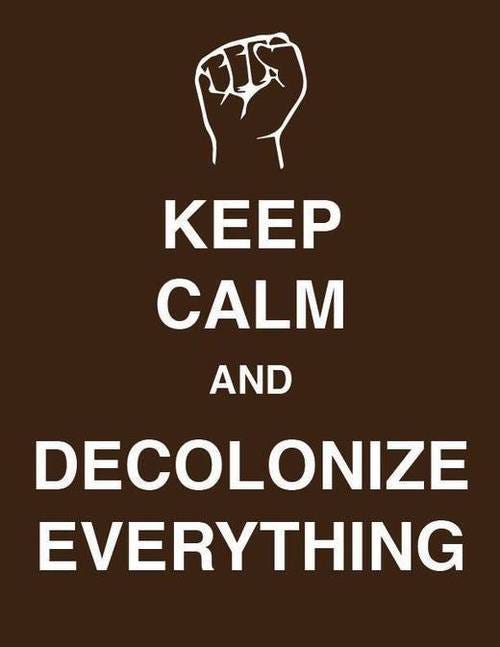
“Decolonizing music” begins with understanding how the major age of European colonialism (1492-mid 20th century) affected and continues to influence the way we think about music. During this period, certain ideas about what music is and how music works were repressed in the name of the modernity and progress. The result is financial and social inequity between different types of music practitioners and consumers. Particularly vulnerable are musicians and listeners from colonized peoples. What might happen if we were to recuperate some of these previously repressed ideas? What can we do to create a more just and equitable world for music cultures? This seminar is open to graduate students in all disciplines.
All reading and listening materials will be made available through the Canvas course site.
Summer 2019 Course Offering
MUS 359: Music of the Americas
First session, June 24 – July 21, 2019
MTWR 12-1:50 PM Collier House 103
 The Americas is a broad geographic expanse covering a range of cultures that is impossible to cover in-depth in a single academic term. There are ideas, however, that can help us bring important aspects of these cultures together: colonialism, processes of cultural exchange, and modernity. We will study these ideas through the music and cultures of at least three countries in the Americas (Brazil, Mexico, and Peru). No musical experience is necessary, but students will be asked to think through listening examples to understand why different musics sound the way they do. While we focus on three regions, the ideas are applicable throughout the Americas. This course fulfills the AC (American Cultures) Multicultural Requirement.
The Americas is a broad geographic expanse covering a range of cultures that is impossible to cover in-depth in a single academic term. There are ideas, however, that can help us bring important aspects of these cultures together: colonialism, processes of cultural exchange, and modernity. We will study these ideas through the music and cultures of at least three countries in the Americas (Brazil, Mexico, and Peru). No musical experience is necessary, but students will be asked to think through listening examples to understand why different musics sound the way they do. While we focus on three regions, the ideas are applicable throughout the Americas. This course fulfills the AC (American Cultures) Multicultural Requirement.Spring 2019 Course Offerings
MUS 359: Music of the Americas
TR 12:00-1:20 PM + Discussion Section, Room: Clinical Services 250 (CLS 250)
 The Americas is a broad geographic expanse covering a range of cultures that is impossible to cover in-depth in a single academic term. There are ideas, however, that can help us bring important aspects of these cultures together: colonialism, processes of cultural exchange, and modernity. We will study these ideas through the music and cultures of at least three countries in the Americas (Brazil, Mexico, and Peru). No musical experience is necessary, but students will be asked to think through listening examples to understand why different musics sound the way they do. While we focus on three regions, the ideas are applicable throughout the Americas. This course fulfills the AC (American Cultures) Multicultural Requirement.
The Americas is a broad geographic expanse covering a range of cultures that is impossible to cover in-depth in a single academic term. There are ideas, however, that can help us bring important aspects of these cultures together: colonialism, processes of cultural exchange, and modernity. We will study these ideas through the music and cultures of at least three countries in the Americas (Brazil, Mexico, and Peru). No musical experience is necessary, but students will be asked to think through listening examples to understand why different musics sound the way they do. While we focus on three regions, the ideas are applicable throughout the Americas. This course fulfills the AC (American Cultures) Multicultural Requirement.T 4:00-5:20 PM plus half-hour sectional rehearsal on Thursday depending on interest, Room: World Music Ensemble Room, Gerlinger 119
 General class description: One intellectual current within ethnomusicology is the idea of bi-musicality, or the ability to be fluent in more than one musical system. This course emphasizes the practice of music-dance from a specific region/culture and asks students to reflect on how this practice may compare with the musical systems they already have experience with. Students will be asked to take an embodied approach in learning. At the end of the term, students will share what they have learned with others through an end-of-term presentation. Students taking the class for additional credit (beyond 2.0 credits) are required to do additional work such as write an end-of-term research paper or produce a creative project related to region in question. A single credit is available for those who have taken MUS 365 or MUS 410 with a Puerto Rican focus previously.
General class description: One intellectual current within ethnomusicology is the idea of bi-musicality, or the ability to be fluent in more than one musical system. This course emphasizes the practice of music-dance from a specific region/culture and asks students to reflect on how this practice may compare with the musical systems they already have experience with. Students will be asked to take an embodied approach in learning. At the end of the term, students will share what they have learned with others through an end-of-term presentation. Students taking the class for additional credit (beyond 2.0 credits) are required to do additional work such as write an end-of-term research paper or produce a creative project related to region in question. A single credit is available for those who have taken MUS 365 or MUS 410 with a Puerto Rican focus previously.
Specific description: This term is dedicated to learning about the music-dance traditions of Puerto Rico. Several of these are drumming traditions that invite participation (bomba and plena), and everyone will learn a tune in these genres. We will also explore the jibaro orchestra (cuatros / guitars / güicharo / bongó). Other traditions such as dance orchestra (strings, horns, and percussion) and beyond may also be available, depending upon what skills students bring with them to the class. All students will be expected to sing and perform basic dance steps. No prior musical experience necessary. Visiting guest artists may give additional guidance through concerts and workshops. Readings provided on Canvas. Instruments will be loaned for class as needed.
Winter 2019 Course Offerings
MUS 365: Regional Topics in Ethnomusicology [TOP: MUSIC IN PUERTO RICO]
TR 4:00-5:50 PM Room: 142 Frohnmayer Music Building
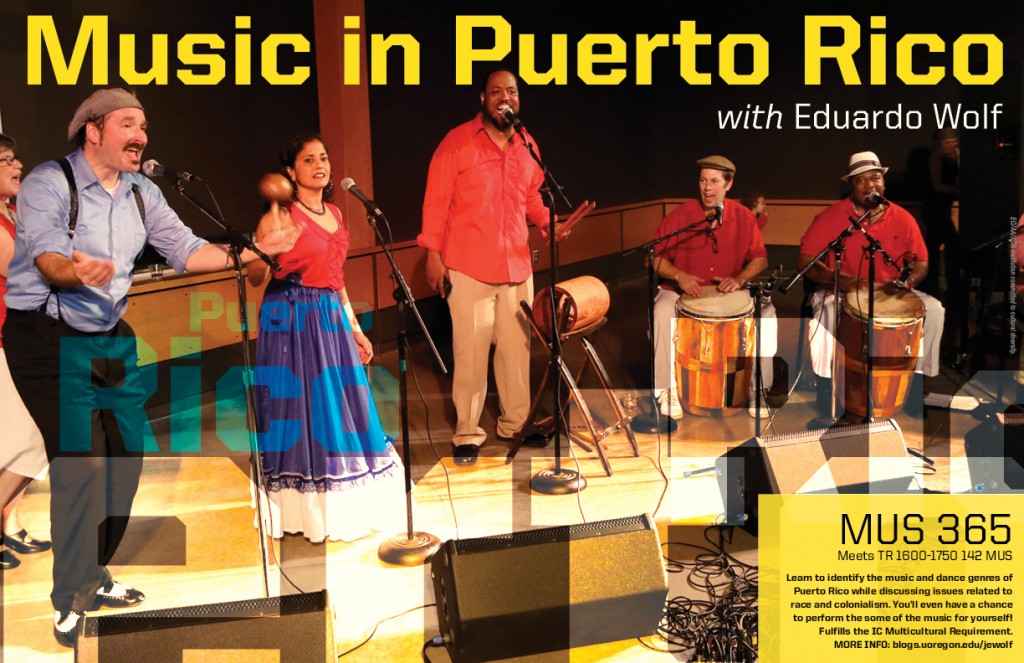
This version of the course focuses primarily on the island of Puerto Rico. The classic trope about its music is that it resulted of the mixing of three cultures: African, European, and Native American. This orientation, however, asks us to think critically about the relationship between our ideas of music and race. We will explore the ways in which genres are described in terms of racial stereotypes as well as attempt to understand how history both supports and undermines these culturally engrained notions. Because of Puerto Rico’s colonial relationship with the United States, we will also examine how people in the United States, including those of Puerto Rican descent, see Puerto Rican music, which often reflects the politics of Puerto Rican sovereignty. In addition to reading, discussion, and listening, students will also work to attain basic skills for performing several of the featured genres. This course fulfills the IC (International Cultures) Multicultural Requirement.
Reading or listening materials will be made available on the course Canvas site and include authors like Frances Aparicio, Peter Manuel and Wayne Marshall.
MUS 452/552: Musical Instruments of the World
TR 10:00-11:50 AM Room: 167 Frohnmayer Music Building
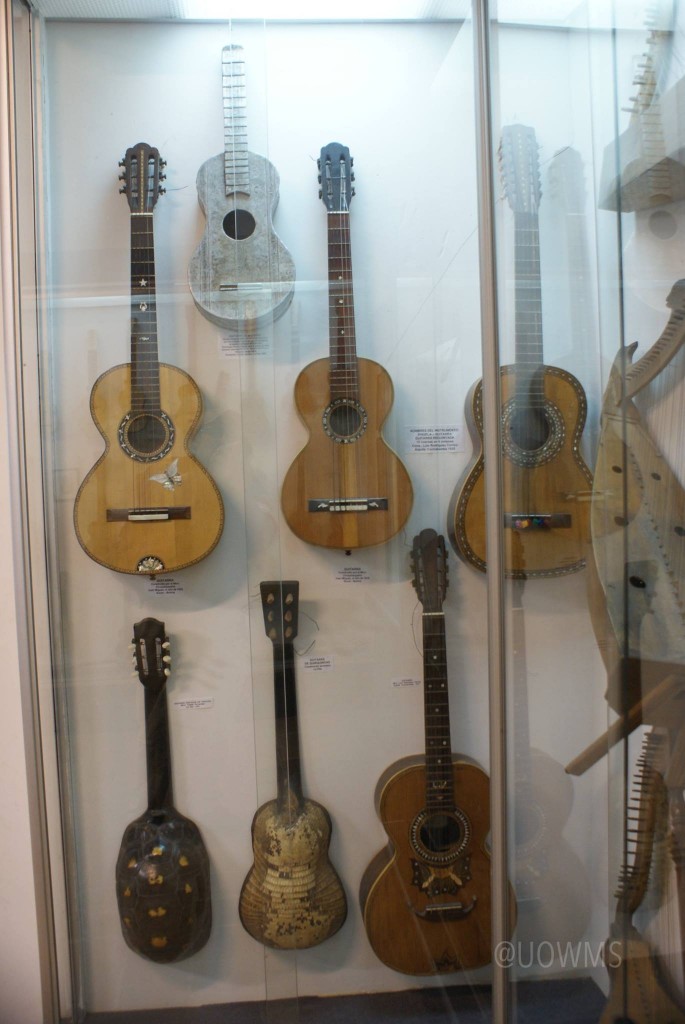
Musical instruments are tools that humans have created to shape their sound environments. They reflect the cultural values that communities of humans share. In this class, we will examine these tools, seeking to understand how they work: mechanically, aesthetically, and socially. We will also explore how and why scholars have studied musical instruments, even taking the time to build some. Questions include: why have some musical instruments become icons of a nation? How should we classify the vast number of instruments in the world? What does it mean for instruments to circulate around the world? Students will have the opportunity to research an instrument of their choice more thoroughly. This course fulfills the IC (International Cultures) Multicultural Requirement.
Reading or listening materials will be made available on the course Canvas site and may include authors like Max Peter Baumann, John Blacking, Cornelia Fales, and Mark Katz.
Fall 2018 Course Offerings
MUS 358: Music in World Cultures
TR 8:30-9:50 AM Room: CLS 250 + Discussion Section
Beyond humanly organized sound, music is a tool to think with. The different ways in which humans use and talk about music can teach us much about each other. In this class, we will examine music-related practices from cultures associated with three different regions of the world (Fall 2017: South India, China, Hispanic Caribbean). You will learn how people raised in these cultures produce and perceive these musics as well as what concepts scholars have developed to understand these expressions more generally. Beyond exposing you to musics that you may not be familiar with, my goal is for you to apply the concepts you learn here to think critically about the multiple cultural performances you experience in your own lives. This course fulfills the IC (International Cultures) Multicultural Requirement.
Selected Texts Include:
Lau, Frederick. 2008. Music in China. Oxford University Press: New York.
Moore, Robin. 2010. Music in the Hispanic Caribbean. Oxford University Press: New York.
Viswanathan, T. and Matthew Harp Allen. 2004. Music in South India. Oxford University Press: New York.
You will also need an i-clicker for this class.
Summer 2018 Class Offerings
MUS 359: Music of the Americas
Second session, July 23 – August 19, 2018
M-R 12:00-1:50 PM Collier House, Rm. 103
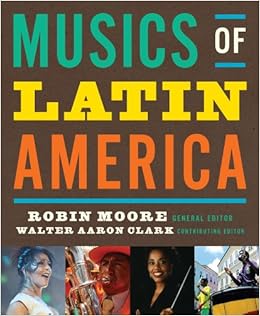
The Americas is a broad geographic expanse covering a range of cultures that is impossible to cover in-depth in a single academic term. There are ideas, however, that can help us bring important aspects of these cultures together: indigeneity, colonization, diaspora, and hybridity. Using these ideas, we will look at three countries and cultures in the Americas to see these ideas help us analyze music in these specific regions. No musical experience is necessary, but students will be asked to think through listening examples to understand why different musics sound the way they do. While we focus on three regions, the ideas are applicable throughout the Americas. This course fulfills the AC (American Cultures) Multicultural Requirement.
Selected Texts Include:
Moore, Robin with Walter Aaron Clark (eds). 2012. Musics of Latin America. W.W. Norton & Company: New York.
Spring 2018 Class Offerings
MUS 359: Music of the Americas
TR 12:00-1:20 PM + Discussion Section, Room: Clinical Services 250 (CLS 250)
The Americas is a broad geographic expanse covering a range of cultures that is impossible to cover in-depth in a single academic term. There are ideas, however, that can help us bring important aspects of these cultures together: indigeneity, colonization, diaspora, and hybridity. Using these ideas, we will look at three countries and cultures in the Americas to see these ideas help us analyze music in these specific regions. No musical experience is necessary, but students will be asked to think through listening examples to understand why different musics sound the way they do. While we focus on three regions, the ideas are applicable throughout the Americas. This course fulfills the AC (American Cultures) Multicultural Requirement.
Selected Texts Include:
Selected Texts Include:
Crook, Larry. 2009. Music of Northeast Brazil: Second Edition. Routledge: New York.
Madrid, Alejandro. 2013. Music in Mexico. Oxford University Press: New York.
Turino, Thomas. 2008. Music in the Andes. Oxford University Press: New York.
You will also need an i-clicker for this class.
M 5:00-6:20 PM plus half-hour sectional rehearsal, Room: World Music Ensemble Room, Gerlinger 119
 General description: One intellectual current within ethnomusicology is the idea of bi-musicality, or the ability to be fluent in more than one musical system. This course emphasizes the practice of music-dance from a specific region/culture and asks students to reflect on how this practice may compare with the musical systems they already have experience with. Students will be asked to take an embodied approach in learning. At the end of the term, students will share what they have learned with others through an end-of-term presentation. Students taking the class for additional credit (beyond 2.0 credits) are required to do additional work such as write an end-of-term research paper or produce a creative project related to region in question.
General description: One intellectual current within ethnomusicology is the idea of bi-musicality, or the ability to be fluent in more than one musical system. This course emphasizes the practice of music-dance from a specific region/culture and asks students to reflect on how this practice may compare with the musical systems they already have experience with. Students will be asked to take an embodied approach in learning. At the end of the term, students will share what they have learned with others through an end-of-term presentation. Students taking the class for additional credit (beyond 2.0 credits) are required to do additional work such as write an end-of-term research paper or produce a creative project related to region in question.
Term description: This term is dedicated to learning about the music-dance traditions of Puerto Rico. Several of these are drumming traditions that invite participation (bomba and plena), and everyone will learn a tune in these genres. We will also explore the jibaro orchestra (cuatros / guitars / güicharo / bongó). Other traditions such as dance orchestra (strings, horns, and percussion) and beyond may also be available, depending upon what skills students bring with them to the class. All students will be expected to sing and perform basic dance steps. No prior musical experience necessary. Visiting guest artists will give additional guidance through concerts and workshops.
Readings provided on Canvas. Instruments will be loaned for class as needed.